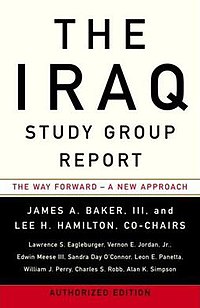
Back مجموعة دراسة العراق Arabic Baker-Hamilton-kommissionen Danish Baker-Kommission German گروه مطالعات عراق Persian Groupe d'étude sur l'Irak French Iracka Grupa Studyjna Polish Iraq Study Group Romanian Bakerkommissionen Swedish

The Iraq Study Group (ISG), also known as the Baker-Hamilton Commission, was a ten-person bipartisan panel appointed on March 15, 2006, by the United States Congress, that was charged with assessing the situation in Iraq and the US-led Iraq War and making policy recommendations.[1] The panel was led by former Secretary of State James Baker and former Democratic congressman from Indiana Lee H. Hamilton and was first proposed by Virginia Republican Representative Frank Wolf.[2][3]
The Iraq Study Group was facilitated by the United States Institute of Peace, which released the Iraq Study Group's final report on their website on December 6, 2006.[4] The report described the situation in Iraq as "grave and deteriorating" and was the culmination of interviews with 170 people, a trip to Iraq, and seven months of research and policy analysis.[5]
- ^ Rubin, Michael (2006-10-30). "Conclusion First, Debate Afterwards". The Weekly Standard. Archived from the original on 2007-09-29. Retrieved November 14, 2006.
- ^ Abramowitz, Michael; Ricks, Thomas E. (2006-11-12). "Panel May Have Few Good Options to Offer". Washington Post. Archived from the original on 2017-08-27. Retrieved 2018-02-23.
- ^ Barrett, Ted. "Congress forms panel to study Iraq war Archived November 7, 2016, at the Wayback Machine", CNN.com, March 15, 2006. Retrieved October 11, 2006.
- ^ "The Iraq Study Group". U.S. Institute of Peace. Archived from the original on 2021-03-02. Retrieved 2021-02-22.
- ^ "Iraq Study Group". United States Institute of Peace. 2009-03-17. Archived from the original on 2017-03-10. Retrieved 2018-02-23.